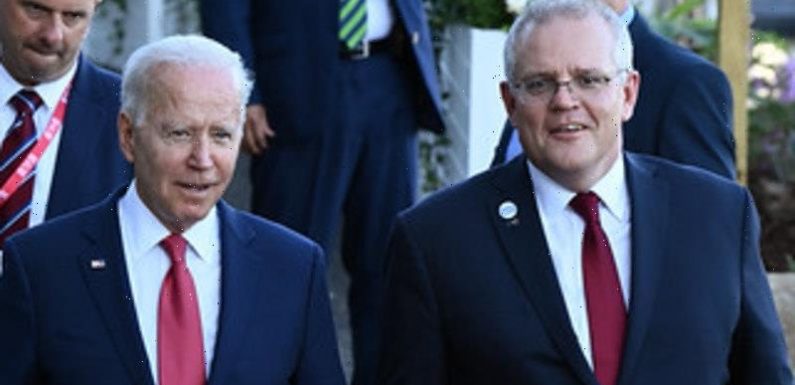
Washington: Prime Minister Scott Morrison is preparing to use his first one-on-one meeting with Joe Biden later this month to urge the US President to make challenging China’s growing influence in the Asia-Pacific one of his top foreign policy priorities.
Morrison is set to meet with Biden, Indian Prime Minister Narendra Modi and outgoing Japanese Prime Minister Yoshihide Suga at the first face-to-face meeting of the “Quad” grouping at the White House on September 24.
Morrison is also expected to hold his first bilateral meeting with Biden since the President took office in January during his trip to Washington.
British Prime Minister Boris Johnson joined Biden and Morrison for their first in-person meeting at the G7 summit in Cornwall in June.
Prime Minister Scott Morrison and US President Joe Biden met for the first time in Cornwall in June. Credit: Supplied
Morrison’s planned meeting with Biden will offer an important opportunity to cement a personal relationship with the Democratic Party standard-bearer almost two years after his Republican predecessor Donald Trump feted Morrison at the White House with a rare State Dinner.
Sources familiar with the planning of the trip said the Australian government sees an opportunity to refocus the Biden administration’s attention on the Indo-Pacific following the US withdrawal from Afghanistan.
There was consternation in Canberra last month at Biden’s tardiness in calling Morrison to discuss the evacuation effort from Kabul, reflecting a broader frustration among America’s closest allies at the lack of consultation about the withdrawal.
Morrison and Biden eventually spoke by phone on September 2, three days after the last US troops left Afghanistan.
In a video message last week marking the 70th anniversary of the ANZUS treaty between Australia, the US and New Zealand, Biden said the partnership between the United States and Australia remains as “essential today as it has ever been” and praised the “easy mateship” between the two nations.
Preparations for the Quad meeting came as Biden held his second phone call with Chinese leader Xi Jinping since he took office.
The official White House readout of the call said it was part of Biden’s “ongoing effort to responsibly manage the competition between the United States and the PRC”.
“President Biden underscored the United States’ enduring interest in peace, stability, and prosperity in the Indo-Pacific and the world and the two leaders discussed the responsibility of both nations to ensure competition does not veer into conflict,” the summary of the call said.
Once disparaged for failing to live up to its promise, the Quad grouping of the US, Australia, India and Japan has rapidly emerged as an influential bulwark against China’s growing assertiveness in the region.
The Quad leaders held their first meeting via teleconference in March, where they pledged to distribute one billion COVID-19 vaccine doses to developing countries in the Asia-Pacific.
“It is the Indo-Pacific that will now shape the destiny of our world in the 21st Century,” Morrison said at the meeting, adding he believed the virtual summit marked “a new dawn” in the region.
US leader Joe Biden, Japan’s Yoshihide Suga, Australia’s Scott Morrison and India’s Narendra Modi during a virtual Quad meeting hosted by Japan in March.Credit:Bloomberg
Infrastructure spending is expected to be an important focus of the Washington meeting, as well as vaccine distribution which was disrupted when India was hit by the Delta strain.
Long-held plans to hold the first face-to-face leaders meeting this month appeared to be thrown into disarray when Japanese Prime Minister Suga announced he was stepping down from the prime ministership.
But the Biden administration decided it was not worth delaying the meeting given Suga’s replacement will come from the same party and pursue the same foreign policy goals as his predecessor.
On the day the last American troops left Kabul, Biden said the US was turning the page on its Middle East-focussed foreign policy over the past two decades.
“The world is changing,” Biden said. “We’re engaged in a serious competition with China. We’re dealing with the challenges on multiple fronts with Russia. We’re confronted with cyberattacks and nuclear proliferation.”
Get a note direct from our foreign correspondents on what’s making headlines around the world. Sign up for the weekly What in the World newsletter here.
Most Viewed in World
From our partners
Source: Read Full Article

